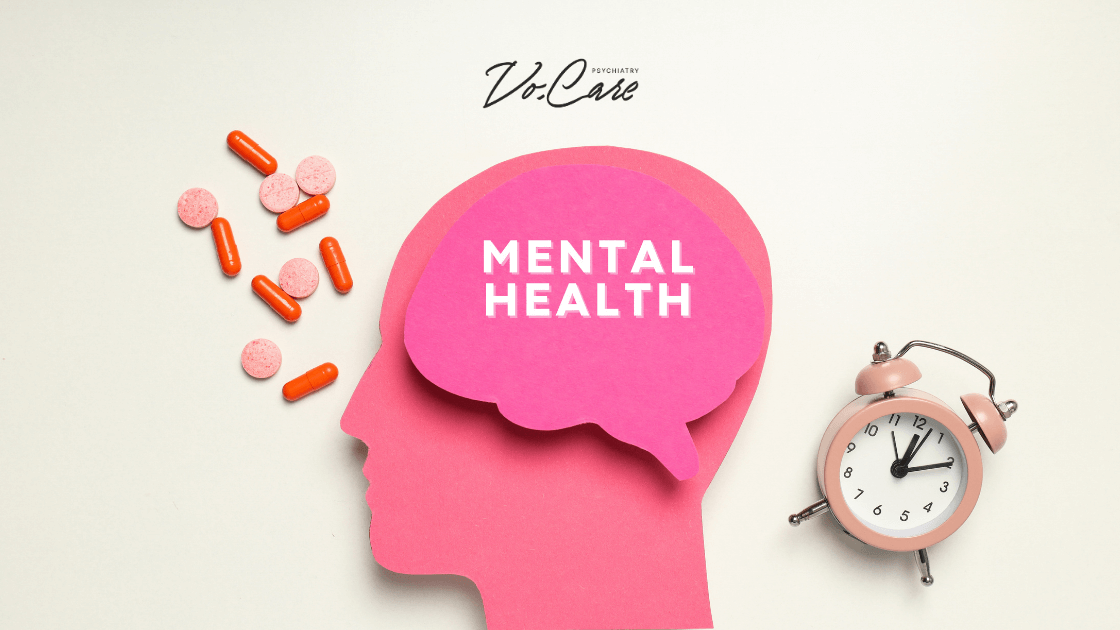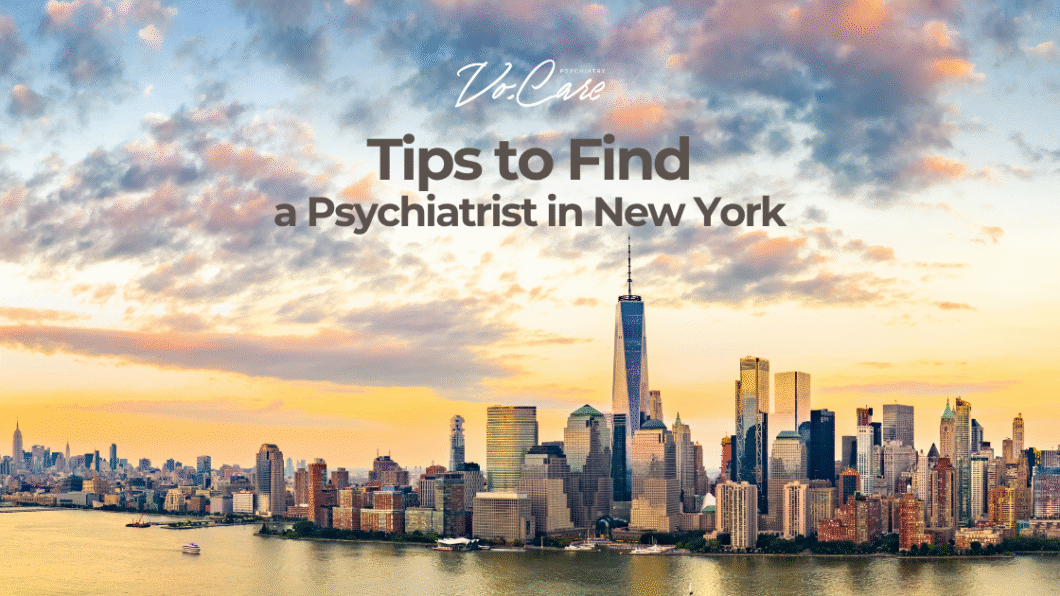TL;DR
-
If you’re trying to find a psychiatrist in New York, start with your goals (symptoms, diagnoses, meds history) and constraints (insurance, budget, schedule, telehealth vs in-person).
-
Build a shortlist from multiple sources at once: PCP referrals, insurance directories, APA’s Find-a-Psychiatrist, Psychology Today, Zocdoc, Talkiatry.
-
Verify NY licensure and board certification, confirm fees and policies, and book 2–3 consults.
-
Prioritize clinical fit (clear plan, good communication) and logistical fit (availability, location, cost).
-
Red flags: unclear credentials, “quick cures,” poor communication, boundary issues, or opaque billing.
-
Want a guided next step? Vo.Care offers psychiatry, behavioral therapy, and talk therapy—book an intro consult today.
New York’s pace is fast, choices are endless, and that includes mental health care. The upside: you have options. The challenge: sorting through insurance rules, availability, and treatment styles. This guide gives you a short, practical path to find a psychiatrist in New York who fits your needs and your life.

Start with what you need (and what you can do right now)
Before you find a psychiatrist in New York, get clear on your goals, history, and logistics—this turns a scattered search into a focused plan and makes every first call more productive.
-
Goals: anxiety, depression, ADHD, bipolar spectrum, insomnia, perinatal mental health, trauma, OCD—note symptoms and what “better” would look like in 30–90 days.
-
History: meds tried, doses, side effects, helpful therapies, medical conditions, recent labs.
-
Logistics: insurance benefits, budget, preferred neighborhoods, telepsychiatry vs in-person, time windows.
These basics make every search and first call faster.
Where New Yorkers Actually Find Psychiatrists
Treat the search like a funnel: cast a wide net across referrals, insurance portals, and trusted platforms, then narrow fast based on availability, costs, and clinical focus.
- Professional & personal referrals – Ask your primary care provider and trusted clinicians; tap friends/colleagues if you’re comfortable.
-
Insurance directories – Your plan’s portal (in-network filter + new-patient availability).
-
Trusted directories & platforms:
-
APA “Find a Psychiatrist” (verified MD/DO psychiatrists)
-
Psychology Today (filters for insurance, specialty, approach)
-
Talkiatry (insurance-friendly matching; many show availability and costs)
-
-
Telepsychiatry: Many NY psychiatrists offer secure video visits—often the fastest way to start, then shift to hybrid if needed.
Pro tip: send 3–5 inquiries at once with a short, structured message (reason for care, insurance, time windows).
Costs, Insurance, and Timing—Set Expectations Early
In New York, private-pay full comprehensive psychiatric evaluations generally range from $800 to over $1,200, while in-network visits are usually billed at your copay or coinsurance. To make care more accessible, Vo.Care offers income-based sliding scale fees.
If a psychiatrist is out of network, ask for a receipt. You may still be eligible for partial or full reimbursement through out-of-network benefits. However, coverage varies by plan. It’s always best to contact your insurance provider directly to confirm if your plan includes out-of-network coverage and understand what percentage or amount they reimburse.
When you call your insurance, you can ask:
-
“Does my plan include out-of-network benefits for outpatient mental health services?”
-
“What’s my out-of-network deductible for mental health services?”
-
“Do I need to meet my out-of-network deductible before benefits apply?”
Telehealth often shortens wait times and helps you start sooner, though certain subspecialties may have waitlists. Before you book, clarify practice policies—rescheduling and no-shows, controlled-substance prescribing and monitoring, refill turnaround times, secure messaging, and any administrative fees—so you can compare options fairly and avoid surprises as you find a psychiatrist in New York.
Is the New York Pyschiatrist a Good Fit?
A strong fit feels steady and collaborative. You’re heard, the plan makes sense, and next steps are specific. Sessions have a natural rhythm; you leave clearer about your meds, monitoring, and what to watch between visits. Over time, your clinician connects patterns across weeks, adjusts thoughtfully, and you notice gradual shifts in mood, energy, sleep, focus, or functioning. If the connection or plan doesn’t feel right, it’s okay to try someone new—fit and follow-through drive outcomes.
Red Flags to Avoid
A few patterns reliably signal trouble; spotting them early protects your time, money, and safety.
-
Unclear license/board status in NY, or reluctance to verify credentials
-
Promises of quick cures or one-size-fits-all regimens
-
Vague or rushed explanations for diagnoses/med changes
-
Boundary issues, frequent cancellations, or poor follow-up
-
Opaque fees or pressure for large prepayments without documentation

Vo.Care Psychiatry and Behavioral Therapy Can Help You Move Faster
If you’d like a guided path, Vo.Care offers psychiatry (medication management), behavioral therapy, and talk therapy under one roof. We’ll help you clarify goals, review options, and match you with a clinician who aligns with your needs—then adapt the plan as life changes. Learn more or book an intro consult at vo.care/about.
Learn more or book an intro consult at vo.care/new-patient/—and let’s figure out what support looks like for you right now.
FAQ: Find a Psychiatrist in New York
Psychiatrists are MD/DO physicians who diagnose and can prescribe medication. Psychologists (PhD/PsyD) and therapists (LCSW, LMHC, LMFT, etc.) provide psychotherapy; some also do testing. Many people benefit from both.
We are an out-of-network practice, which means we do not bill insurance directly. Payment is due at the time of your session. However, many insurance plans (especially PPOs) include “out-of-network” benefits that may cover a significant portion of our fee.
After each session, we can provide you with a Superbill—a specialized medical receipt containing all the necessary codes—which you can submit to your insurance provider. If you have out-of-network coverage, they will mail you a check for the reimbursement amount directly. We recommend calling your insurance provider before your first visit to confirm your specific deductible and reimbursement rates.
Some do, many focus on medication management and collaborate with therapists. Ask about session length, approach, and coordination.
Telepsychiatry often has faster openings (days to a couple weeks). In-person subspecialties may take longer. Message several practices at once.
Bring a concise history (symptoms, meds tried/doses/side effects, diagnoses, medical issues, labs), current meds/supplements, and clear goals for the next 30–90 days.
Labs are sometimes recommended (e.g., thyroid, metabolic panel) depending on meds/symptoms. Pharmacogenetic testing can be helpful in select cases; it’s not always required.
Often, yes. Ask for a superbill, then submit to your insurer. Reimbursement depends on your plan and deductible.
Expect policies on monitoring (PDMP checks, periodic visits, urine screens, safe-use agreements). Clinicians should discuss risks, benefits, and alternatives.
Initial titration may be every 2–4 weeks; once stable, many patients shift to every 1–3 months. Frequency varies by condition and meds.
Yes. Request a visit summary and med list to ensure continuity.
In the U.S., call or text 988 (Suicide & Crisis Lifeline), 911 (Emergency Hotline) or go to the nearest emergency room.

